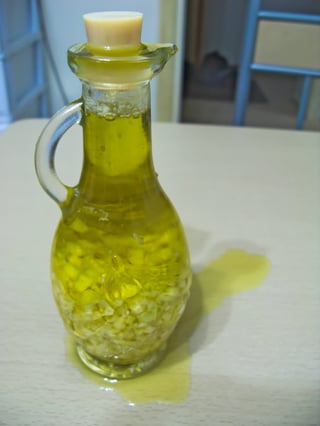I'm the kind of chef who chops up whatever the local bazaar has that week, adds a random amount of seasonings until the color suits my fancy and then cooks it. Somehow. Most days I don't go hungry.
The other day, fresh garlic was really cheap so I bought a bunch. The housewares shop had some little jugs with corks, so I picked one up. Back at home I chopped up a few heads of garlic, stuffed it the jug, then filled the jug with olive oil. Bread for the next two days had had a great dipping sauce! However dipping bread in oil uses up a lot of oil and not very much garlic, so on the second evening when it was about half empty I topped off the jug with fresh oil. I corked it, wiped off the drips from around the top with a paper towel and left it on the table.
This is what I found in the morning. (click for larger)
I am certain when I corked it the level of oil was below the bottom of the cork because I tipped it to see how the garlic was getting an and remember the air moving around in the jug. I am also certain the top was clean having wiped it off, and of course there was no puddle. Even stranger, as I have left it there today it has continued to drip.
The only clew seems to be garlic mixture seems to be producing periodic bubbles that float up through the oil. This does not explain to me how the oil got out, but it does seem like it must be producing
I see three fields for questioning:
- Casual kitchen tinkerer: How should I safely store my garlic and olive oil? Is there danger to storing this in something that seals better than a plastic cork? Is it safe to eat?
- Amateur chemist: Is there a chemical reaction going on between the garlic and the oil? Would it ever explode?
- Wannabe physicist: How did the oil get out? This seems like a gravity defying stunt. Note the current oil level is about ½" below the cork.
Somebody please tell me why my day's adventure at the bazaar made this much mess and how to make yummy things with garlic and olive oil safely!

